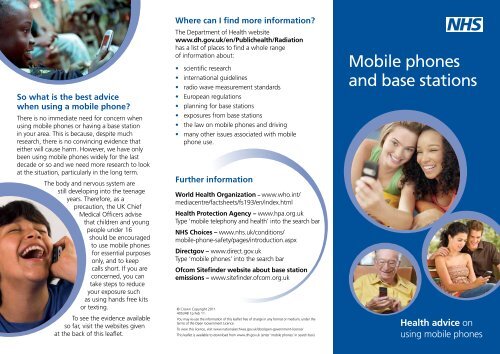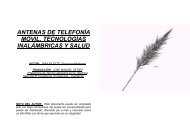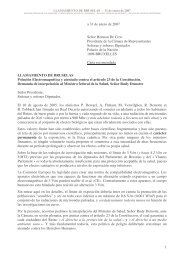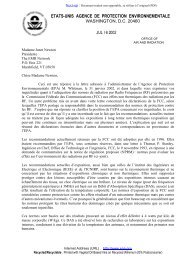Mobile phones and base stations - Gov.UK
Mobile phones and base stations - Gov.UK
Mobile phones and base stations - Gov.UK
You also want an ePaper? Increase the reach of your titles
YUMPU automatically turns print PDFs into web optimized ePapers that Google loves.
So what is the best advice<br />
when using a mobile phone?<br />
There is no immediate need for concern when<br />
using mobile <strong>phones</strong> or having a <strong>base</strong> station<br />
in your area. This is because, despite much<br />
research, there is no convincing evidence that<br />
either will cause harm. However, we have only<br />
been using mobile <strong>phones</strong> widely for the last<br />
decade or so <strong>and</strong> we need more research to look<br />
at the situation, particularly in the long term.<br />
The body <strong>and</strong> nervous system are<br />
still developing into the teenage<br />
years. Therefore, as a<br />
precaution, the <strong>UK</strong> Chief<br />
Medical Officers advise<br />
that children <strong>and</strong> young<br />
people under 16<br />
should be encouraged<br />
to use mobile <strong>phones</strong><br />
for essential purposes<br />
only, <strong>and</strong> to keep<br />
calls short. If you are<br />
concerned, you can<br />
take steps to reduce<br />
your exposure such<br />
as using h<strong>and</strong>s free kits<br />
or texting.<br />
To see the evidence available<br />
so far, visit the websites given<br />
at the back of this leaflet.<br />
Where can I find more information?<br />
The Department of Health website<br />
www.dh.gov.uk/en/Publichealth/Radiation<br />
has a list of places to find a whole range<br />
of information about:<br />
• scientific research<br />
• international guidelines<br />
• radio wave measurement st<strong>and</strong>ards<br />
• European regulations<br />
• planning for <strong>base</strong> <strong>stations</strong><br />
• exposures from <strong>base</strong> <strong>stations</strong><br />
• the law on mobile <strong>phones</strong> <strong>and</strong> driving<br />
• many other issues associated with mobile<br />
phone use.<br />
Further information<br />
World Health Organization – www.who.int/<br />
mediacentre/factsheets/fs193/en/index.html<br />
Health Protection Agency – www.hpa.org.uk<br />
Type ‘mobile telephony <strong>and</strong> health’ into the search bar<br />
NHS Choices – www.nhs.uk/conditions/<br />
mobile-phone-safety/pages/introduction.aspx<br />
Directgov – www.direct.gov.uk<br />
Type ‘mobile <strong>phones</strong>’ into the search bar<br />
Ofcom Sitefinder website about <strong>base</strong> station<br />
emissions – www.sitefinder.ofcom.org.uk<br />
© Crown Copyright 2011<br />
405348 1p Feb 11<br />
You may re-use the information of this leaflet free of charge in any format or medium, under the<br />
terms of the Open <strong>Gov</strong>ernment Licence.<br />
To view this licence, visit www.nationalarchives.gov.uk/doc/open-government-licence/<br />
This leaflet is available to download from www.dh.gov.uk (enter ‘mobile <strong>phones</strong>’ in search box).<br />
<strong>Mobile</strong> <strong>phones</strong><br />
<strong>and</strong> <strong>base</strong> <strong>stations</strong><br />
Health advice on<br />
using mobile <strong>phones</strong>
Around nine out of<br />
ten households in<br />
the <strong>UK</strong> have access<br />
to a mobile phone<br />
<strong>and</strong> they are now<br />
part of our way<br />
of life. This leaflet<br />
briefly outlines<br />
how mobile <strong>phones</strong><br />
<strong>and</strong> networks work,<br />
provides some answers<br />
to the questions you<br />
might have about them<br />
<strong>and</strong> offers guidance on where<br />
to go for further information.<br />
How do mobile <strong>phones</strong> work?<br />
When you make a call on a mobile phone, the<br />
phone transmits radio waves to the antenna<br />
of a nearby <strong>base</strong> station. The <strong>base</strong> station<br />
then transmits the call using the mobile<br />
telecommunications network to the phone<br />
of the person you are calling.<br />
In towns or cities, where there are many phone<br />
users, more <strong>base</strong> <strong>stations</strong> are needed than in<br />
the countryside. The antennas of <strong>base</strong> <strong>stations</strong><br />
may be mounted on masts, buildings or<br />
other structures.<br />
A useful animation of how mobile phone<br />
networks operate can be found here:<br />
www.mmfai.org/public/start.html<br />
So how safe are <strong>base</strong> <strong>stations</strong><br />
<strong>and</strong> mobile <strong>phones</strong>?<br />
Radio waves from <strong>base</strong> <strong>stations</strong> in this country<br />
comply with international health <strong>and</strong> safety<br />
guidelines. The levels of radio waves emitted from<br />
<strong>base</strong> <strong>stations</strong> in places where the public have<br />
access are generally found to be hundreds or<br />
thous<strong>and</strong>s of times below the health <strong>and</strong> safety<br />
guideline limits. And, although the levels of radio<br />
waves from mobile <strong>phones</strong> are higher than from<br />
<strong>base</strong> <strong>stations</strong>, all mobile <strong>phones</strong> comply with<br />
international <strong>and</strong> <strong>UK</strong> health <strong>and</strong> safety guidelines.<br />
What does the science say<br />
about safety?<br />
Research focusing on mobile telephony over the<br />
last ten years has shown no convincing evidence<br />
that the radio signals from mobile <strong>phones</strong> <strong>and</strong><br />
<strong>base</strong> <strong>stations</strong> cause adverse health effects (refer<br />
to World Health Organization (WHO) website).<br />
In the <strong>UK</strong>, the Health Protection Agency (HPA)<br />
closely monitors all mobile phone <strong>and</strong> health<br />
research. Apart from an accident risk when using<br />
a phone while driving, it states, ‘…there is no clear<br />
evidence of adverse health effects from the use of<br />
mobile <strong>phones</strong> or from phone masts.’ However,<br />
as people have only been using mobile <strong>phones</strong><br />
for relatively few years, the HPA advises that more<br />
research be carried out, especially to investigate<br />
whether there might be longer term effects.<br />
Is it possible to get too close to<br />
<strong>base</strong> <strong>stations</strong> <strong>and</strong> their antennas?<br />
Radio waves get weaker as you get further away<br />
from antennas. Many different structures are used<br />
to host <strong>base</strong> <strong>stations</strong> <strong>and</strong> measures are always put<br />
in place to ensure a safe distance between the<br />
public <strong>and</strong> the antennas.<br />
Do radio waves cause cancer?<br />
The <strong>UK</strong> <strong>Mobile</strong> Telecommunications <strong>and</strong> Health<br />
Research programme reported in 2007 that no<br />
association was found between mobile phone<br />
use of less than ten years <strong>and</strong> cancers of the brain<br />
<strong>and</strong> nervous system. However, as the situation<br />
for long-term exposures is less clear, the HPA<br />
continues to monitor the scientific evidence.<br />
What about mobile <strong>phones</strong><br />
heating up the brain?<br />
Any increase in brain temperature that may occur<br />
from using a mobile phone close to the head is<br />
very small, well within the normal body heating<br />
from everyday activities such as exercise <strong>and</strong> is not<br />
considered by the WHO to be harmful to health.







